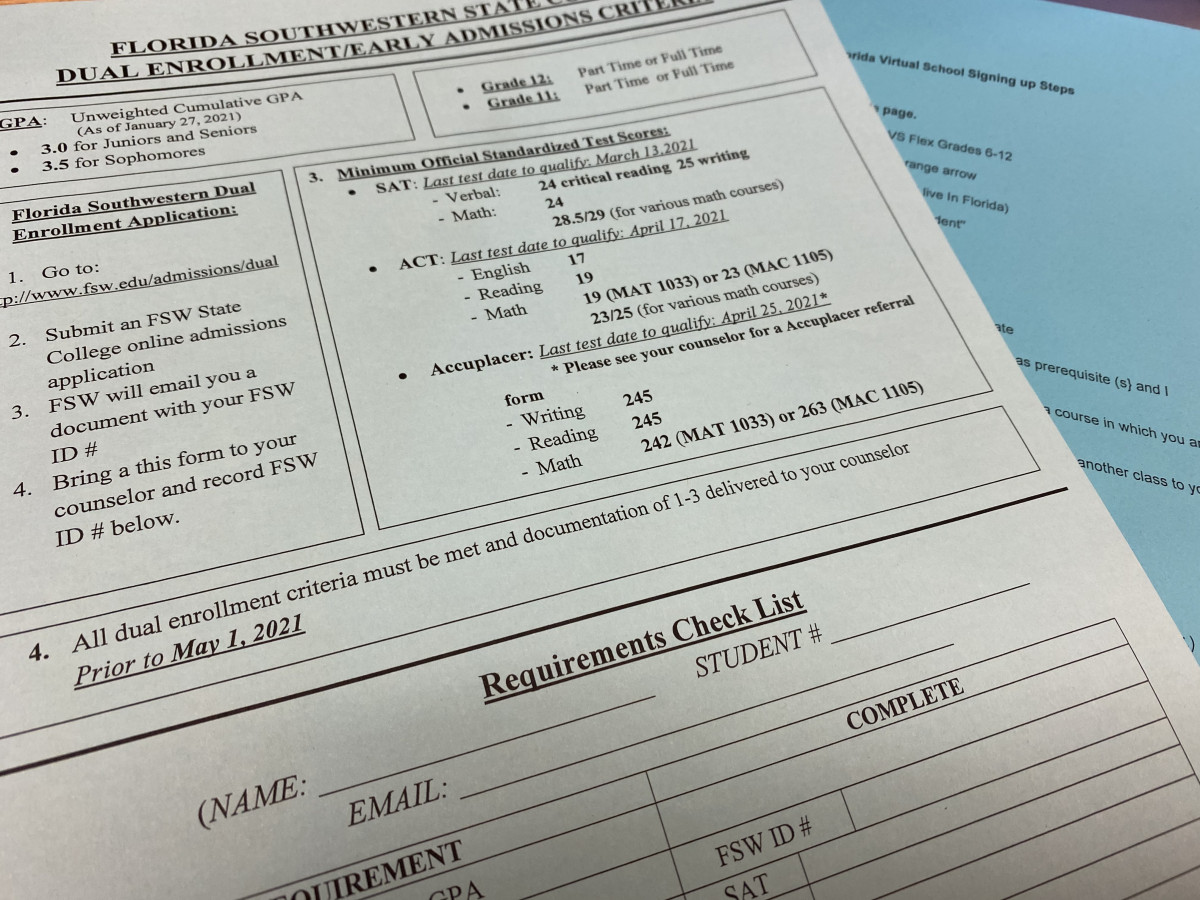Naples High counselors have started preparations for next year’s schedules, and students are already filling out their course selections for next year. Classes were able to meet with their guidance counselors to discuss the process for class requests, which is different than in previous years.
Instead of circling preferred classes on a paper form, students will need to enter their requests on Focus. Teachers are also now required to recommend core classes, like English, science, math, and history, instead of students choosing these on their own.
When planning school schedules, it is important for students to keep credit requirements in mind to ensure that they are on track for graduation. 24 credits are needed by the end of senior year, with a specific number designated for each subject area. More details on graduation requirements may be found on the Collier County district website.
Students also have the option of going on the advanced education pathway, such as AP, AICE and dual enrollment. Some of these classes allow students to earn the AP Capstone Diploma or AICE Diploma.
“I think I’m taking AP Photo, AP Seminar, AP Lang., APUSH and AICE Marine,” sophomore Havana Layton said. “Then on FLVS, I think I’ll take Pre-Calc. Honors and maybe guitar.”
To earn the AP Capstone Diploma, students need to pass AP Seminar and AP Research with a score of 3 or higher, as well as pass four additional AP classes. There is currently no scholarship associated with this diploma, but this may change in the future.
The AICE Diploma requires students to earn seven credits from specific subject groups. Obtaining the AICE Diploma automatically qualifies students for the Bright Futures Scholarship if 100 community service hours are also documented. However, those who are not going on the AICE pathway can still earn Bright Futures by performing well on the SAT.
It is also important to understand that not all colleges accept advanced credits. Although it is likely that selective colleges will not take them, these classes still stand out on applications and provide an advantage.
Many high schoolers have a difficult time deciding whether to take AP or AICE classes. This usually depends on which college they are interested in and where it’s located.
“I think AP classes are more important because they are applicable to more colleges than AICE,” Layton said. “Also, I am more interested in the courses AP offers. I am planning on getting the AP Capstone Diploma. To get that, I have to take AP Seminar this year.”
Some out of state colleges are more familiar with AP classes, so students who are planning to go to school outside of FL tend to focus on these classes.
“I would love to go to a college somewhere out of Florida,” Layton said. “I really want to experience snow, so a college in the northeast might be a good option, but I’m also really interested in Stanford.”
AICE and AP also have very different testing formats. All AICE tests require written responses, with no multiple choice questions, whereas AP has a combination of both. The types of questions on AP exams include FRQs (Free Response Questions), SAQs (Short Answer Questions), DBQs (Document-based Questions) and more.
“Personally, I think AP classes are more important for me because I prefer not to have written based assessments,” sophomore Sabyne Brisson said.
It is always best to choose classes that match students’ interests, because they are more likely to do well.
“I am definitely not trying to achieve the AICE diploma since I am currently not on track for it, but I am undecided if the AP Capstone Diploma is right for me,” Brisson said. “I believe that you should take AP classes that are suited for you and that you are interested in. The seminar and research classes are not something I am particularly interested in.”
High school sports is also a major factor to consider for those who are student athletes. They often look for colleges that have a strong sports department, while still upholding high academic standards.
“The majority of the colleges I am currently interested in are out of state,” Brisson said. “I want to swim at a Division 1 college and the majority of the colleges in Florida that have a good swimming program are not best for me.”
Overall, when picking classes for next year, it is always a good idea to consider plans after high school. Think of potential colleges, majors and places to move to help guide the course selection process.
“I decided [to take] classes like newspaper and Italian to learn and experience new things,” sophomore Addison Klonowski said. “I [also] chose some hard classes to test my knowledge and give me skills for the future.”






